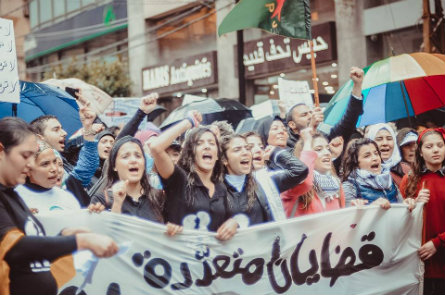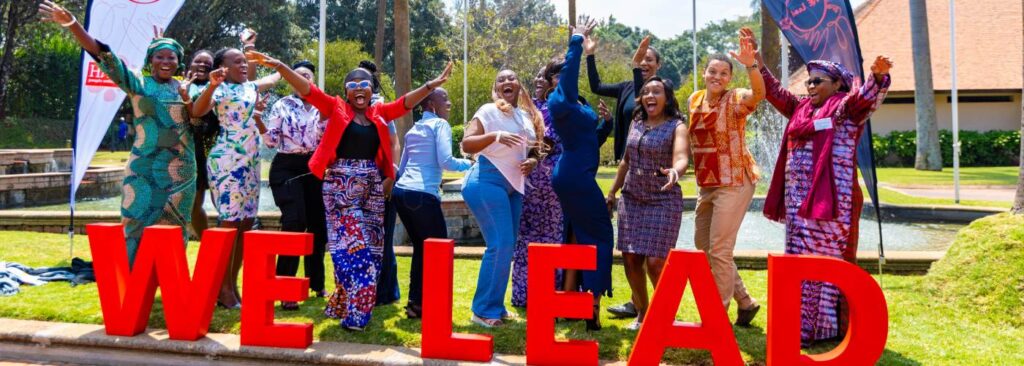Man to woman the evening of March 8: “Your day is over, time to go back to the kitchen”. *laughter*
It’s easy to assume that this type of sexist humour just comes out of typical male cafés in Lebanon.
But this joke was used by seasoned Lebanese television host Marcel Ghanem in a tweet to open his weekly political show ‘Kalam Ennas’ – one of the most-watched political talk shows on mainstream Lebanese television – during the week of International Women’s Day (IWD) 2017!
Yet this shouldn’t come as a shock if you realize that the State Ministry of Women Affairs created in December 2016 and its male first minister, Jean Oghassapian, were what people considered the epitome of championing women’s rights on International Woman’s Day this year.
It would have been acceptable to have a male minister if Lebanon had less institutionalized misogyny and patriarchy enshrined in its legal, social and political structures. Or if Lebanon had more than one female minister in a cabinet of 30, or was a country where the all-time high of women’s representation in parliament was a little more than 6 percent.
When the very few spaces where women can voice their concerns and act are led by men, appointing a man to head this Ministry tells Lebanese women that their political elite could not find a single suitable woman in the government capable of leading it. Not one. This clearly signals the imbalanced gender power dynamics within political structures.
But the issue is not with the minister, because the establishment of a ministry for women’s affairs was never demanded by feminist or women’s rights groups in Lebanon.
The appointment of Jean Oghassapian is emblematic of a larger concern. Only a shameful 3.1 percent of MPs are women, there is well-documented resistance of political parties to women running for municipal elections, and the political class has consistently failed to adopt a women’s quota. Even the new Women’s Ministry has no budget or authority, making it ineffective and almost purely symbolic. At best, incomplete and unimpressive; and at worst complacent and disempowering. It is almost as if this new ministry is a placebo of some sort.
Speaking to an audience at an event celebrating International Women’s Day, Minister Oghassabian divulged that it has always been “his dream to become Minister”. He promised that, “Together we can dream to give women their rights” and proceeded to list ‘achievements’ such as hiring ministry staff, launching the ministry’s website and securing funding from the UNDP as examples.
Now for a few uncomfortable facts.
A ministerial action plan’s purpose is to propose the how, not reiterate the obvious what.
Any organization can launch a website and hire staff. The new ministry would have been truly promising if its first actions had included an action plan detailing how the ministry will deliver results. On paper, the ministry’s task is to advocate for new laws and amendments favoring the advancement of women in Lebanese society. Women’s organizations and activists know the ‘what’ of change. The ‘how’ is what is missing.
The Women’s Affairs Ministry should not be about the minister fulfilling his dream and “helping” women in the process.
The Minister’s dreams of grandeur are of no interest to anyone. The Ministry of Women’s Affairs should be sending messages about how it will address the structural inequalities and challenges women face, their denied right to citizenship and equal pay and benefits, about the fact that custody, divorce and other personal status issues remain in the grip of explicitly discriminatory religious courts. It should be about the ease with which MPs can manipulate the clause that marries criminals to their victims (from rape to abduction of a minor) and then proceed to call this “an achievement for women”.
In one televised interview, Minister Oghassabian stated that before being appointed minister, “women’s issues were not his cause”.
Indeed. Being well versed in the issues of the respective ministries should be a requirement for the appointed ministers, not an afterthought.
But the problematic discourse around women extends well beyond the ministry hype. Inspired by the diverse discussion around International Women’s Day this month, here are some of the common places thrown our way every year on March 8 – and why we’ve had enough of them.
Addressing women as an abstract monolithic group
Celebrating “the woman” in general. This reduces the nuances and complexities of women’s struggles, roles, and contributions into one category, based on the lazy assumption that all women are the same. This not only alienates them from other marginalized groups in the country, but detaches their struggle(s) from the broader context. It ‘others’ women, erases all the different layers of oppression and challenges different women face in Lebanon and avoids any serious discussion about them.
Because women make up 49 percent of the Lebanese population, they are thus entitled to political representation, and should have a 30 percent quota in parliament.
Political representation is a fundamental right for women; a right they have regardless of the percentage of the population they represent. They are entitled to this right as human beings and citizens in a state; not a percentage. If we follow the logic of this argument however, women in Lebanon should claim a quota of 50 percent, not 30. Tying the demand for a quota to the fact that women are “half of the population” makes it sound as if we should justify our reasons for demanding representation, when in fact, it’s a basic right.
“Women are our sisters, mothers, wives, aunts and daughters.”
What about those who aren’t sisters, mothers, wives, aunts and daughters? Do women need to have a relationship to a man to be granted rights? In theory, they shouldn’t, but the collective Lebanese psyche’s need to justify granting women their rights emerges with every attempt to apply a rights-based approach to women.
If all this indicates anything, it’s that the political elite is still intent on keeping women out of government because male supremacy is alive and well in their awareness, and most importantly, in their actions.
Never has the divorce between women and power in the Lebanese psyche been clearer than today. Politics in Lebanon is mostly misunderstood, still predominantly androcentric, with women still largely perceived as belonging outside power and as needing special paternalistic treatment to access it, even minimally. What all of the above points to is that Lebanese society still considers women in power as having ‘taken something’ to which they are not entitled, or as a novelty, a “pilot project”.
Yet all of the above also indicates that our homework after March 8 this year is to re-examine and re-shuffle our own cultural and social assumptions about women in power and find out what is driving our political elite, families, communities, and organizations to disempower women and hold them back from political decision-making positions, despite vigorously claiming the opposite.






